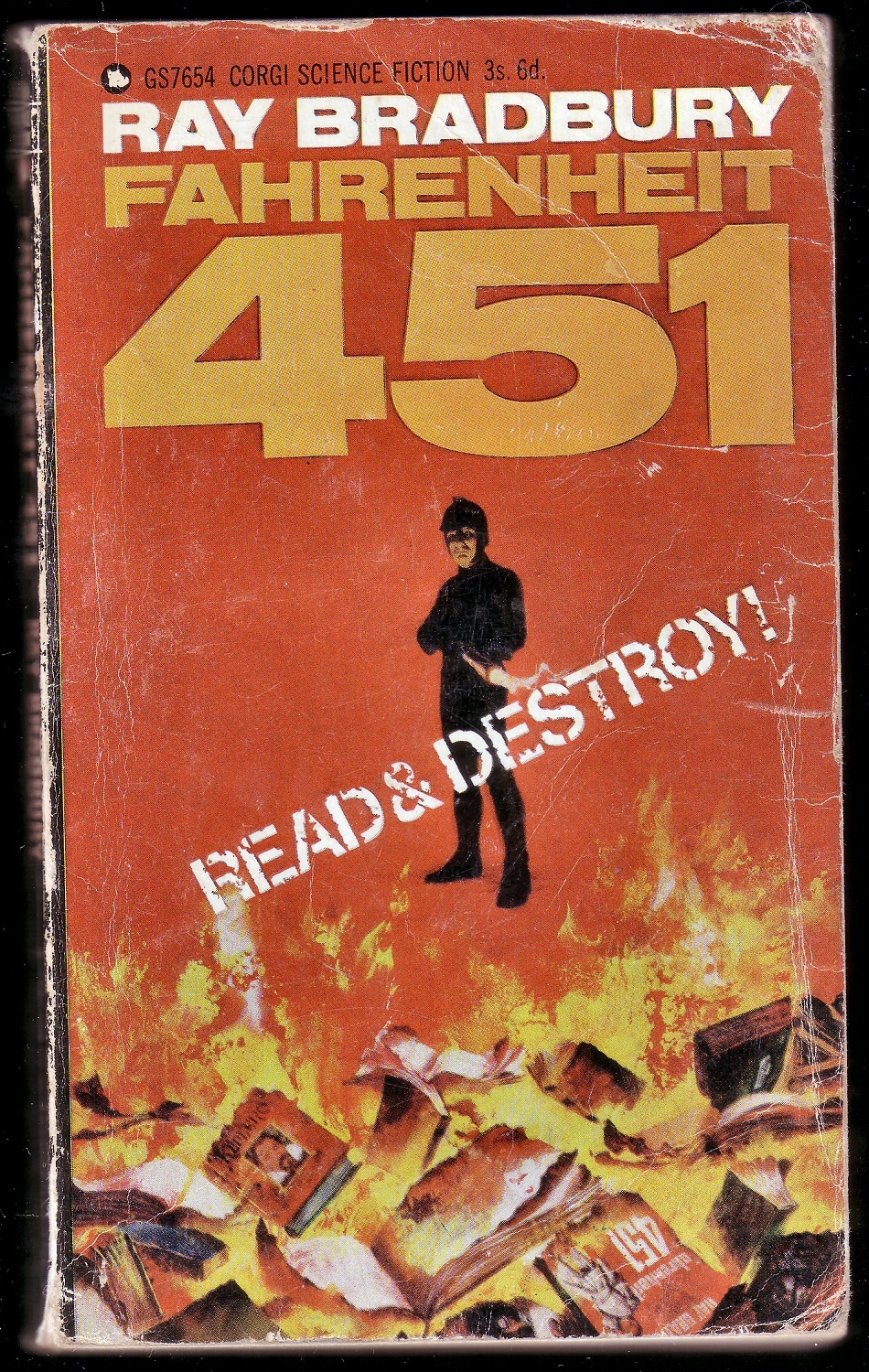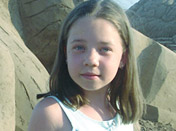
Bradbury’s classic Fahrenheit 451 Newest English edition: Simon & Schuster, 2018. ISBN 9781982102609. raises the question of books in our society: how they make us more human and how censorship and refusal to read can destroy the mind and soul of a person. Papmambook teenage authors discuss how the book has affected their relationship to books and reading.

Valeria Arkhangelskaya, 13, First-season finalist of “Book expert of the XXI Century” contest
Each person is happy in his own way. I, too, have many things that make me happy. It’s not expensive gifts or other material goods. No, for me, happiness might be the sound of raindrops on glass, meetings with friends, time with near and dear people, my favorite music, pleasant memories. Or it might be the rustle of pages, the smell of printed paper fresh off the press. And, of course, immersion in the unforgettable and unreal world of the book.
I’m so glad I’m one of those rare teenagers who loves to read and I’m incredibly happy that people just like that surround me. But I’ve definitely run into people with the opposite relationship to reading. It’s left a visible mark on them. They’re difficult to listen to. Their speech isn’t rich and our native language is replaced by filler words, which grate on the ears.
But all my friends love reading. We have similar tastes in literature, though we do love to argue over books. It was one of my friends who introduced me to this book, Fahrenheit 451. This book became my favorite. And not just the book, but its author, the inimitable science-fiction writer and novelist Ray Bradbury.
The book takes place in the not-so-distant future but it’s not one any of us would like to end up in. No, our planet isn’t taken over by monsters or zombies. It’s far worse. In this future, it’s forbidden to read. Awful as it sounds, reading is even punishable by law. The prevailing rule is: if anything is not the way you like it, destroy it! Burn it, drown it—make sure it’s gone!
Books are burned, and along with them thoughts, feelings, and souls are killed. And people—or more accurately, their shells (because as I see it, their souls burned along with the books)—don’t even want to fight against all this. Their thoughts are consumed with stupid TV programs, and they don’t even notice what’s happening around them. With a world like this, they’re not even living. They just exist.
Books are burned. It’s a sad play on words: firemen used to put out fires—they didn’t start them. In the future, it’s the other way around. And the protagonist, Guy Montag works in their ranks. But his entire worldview, position, and stereotypes change when he meets an amazing girl named Clarisse. It’s said that chance meetings are never pure chance. Unlike all the other people of the future, she lives in the moment. She likes walking in the rain, talking with her family in the evenings, finding the magic in the most simple, ordinary things. The others think this makes her strange, though you’d think it should be the other way around. Guy Montag meets this girl and something clicks. He gets back the love for his wife, which he lost years ago. Moreover, he understands how stupid it is to burn books. The senseless death of Clarisse gives him the final push he needs to realize it’s time to fight back. He must fight to the end for his ideals. And he starts to do so, gathering a group of like-minded people. He starts to fight for the future of his descendants.
I absolutely support the idea that you should fight for what you consider important, even if no one else cares. You have to go forward till end—who knows what reward awaits. The poet Juan Ramon Jimenez put it very well in the book’s epigraph: “If they give you lined paper, write the other way.”
The worst part is that if we all stop reading, this is exactly the future that awaits us! Us, our children, grandchildren, great-grandchildren…A fate of simply existing, without truly living. Not noticing the beauty in simple things, not valuing every second of our wonderful, ever-changing, amazing lives. All this surrounds us every day—we just have to stop and look.
I learned to do just that thanks to this book. I learned to value time and every second. I learned to find joy in even the littlest things. I learned to find the positives in the sad moments. And I believe literature should do just that. Books should inspire you to do something, should teach you something, bring happiness in the darkest times.


Daria Vedyanskaya, 14, First-season finalist of “Book Expert of the XXI Century” contest
As someone who doesn’t usually like or even read science fiction, I’d like to say that Ray Bradbury’s Fahrenheit 451 tore down my expectations for the genre.
The first thought that comes to mind while you’re reading is: “How did people allow their souls and minds to be taken from them?” They don’t love and they’re incapable of loving so they’re unhappy, so they don’t remember anything. It all began with book burning. People no longer need deep thoughts about life—anything that would allow you to reflect on the difficulty of existing is subject to burning. Whoever first came up with this way of life was partly right: books and human thought make life more complicated. They don’t let us see the world through rose-colored glasses. But our ability to think is the main difference between humans and animals. Books hold our wisdom, experience, and memory, as Granger, one of the refugees who memorized books, said. Without books, people became stupid (and that’s putting it lightly), empty inside, deeply unhappy, and unable to understand their unhappiness. Amusements, glass walls, and fast driving—that’s all they had.
Then, a fireman(!) by the name of Guy Montag, one of those who fights against books—who burns them, came to understand their value like no one else. Montag breaks the law, saves books, kills his colleague, and ends up wanted and on the run. Nobody, except Faber, a former English teacher, comes to his aid, not even the “Book People”—other former teachers, writers, and Reverends help him. At first, it’s shocking how calm they are. Instead of engaging in an open battle, they prefer to hide out not far from the cities. And that’s the right choice—they would have been simply destroyed, wiped off the face of the earth. Not because they are the minority, but because of the seeming ease of life ordinary people ardently believed in. And if all the book people, all those who remember at least a chapter or a few lines, were killed, then the phoenix of humanity could never rise from the ashes.
So what’s left for Montag and the rest? To wait, wait, wait. Until the “others” kill each other in their endless wars and blow up the last cities, leaving only the ash from which everything can be born anew. And it’s terrible. Humankind falls, rises from its knees to rebuild everything anew, only to destroy everything again.... People, stop before it’s too late!


Evgenia Panova, 13, Second-season finalist of “Book Expert of the XXI Century” contest
“When people look at that tree or that flower you planted, you’re there.” - Granger
The book’s events unfold in a time when firemen don’t put out fires, they start them. Books are no longer the heritage of humanity—wherever they’re found, they’re burned in furnaces. Those who keep them are punished. The main principle of the government is that if people read, they become individuals, and thus harder to control. To avoid rebellion and war, everything that makes the citizens think must be destroyed.
At the beginning of the book I thought the main character Montag was the hero, but having completed it, I realized that it’s probably the mysterious Clarisse, who lived across from Montag. It is Clarisse, after all, who forces the fireman to open his eyes and see the truth, to start thinking. The author wants us to put us, the readers, in the shoes of a former officer, and then he can push us onto the right path, give us a compass, and lead us through the book.
The book presents varied metaphors, descriptions, and hyperbole which creates the impression of a well-drawn-out picture with elaborate patterns and flourishes. Sometimes, while you’re reading you can hear Bradbury’s voice in your head, saying that when you destroy a book, you destroy his thoughts. In destroying his soul, you’re sucking the life out of him. That, in essence, is the book’s hidden meaning.
The book presents feelings and emotions so well that you feel like you’re immersed in the events. I felt my heart pound—not just for Montag, but because of the wonderful books that were burned. Sometimes, the events develop so quickly, you want to shout: “Stop, hold it!” But the story grabs you and refuses to let go.
Having read the truly divine Fahrenheit 451, I understand that the author had set out an itinerary for us in advance and then, as though for the first time, enjoys the view that opens up before us. Along with us, he makes new discoveries, experiences sadness and joy, and even cries. That’s the kind of author Ray Bradbury is.
Each time I touch the pages of a book, I feel and hear the living, beating heart of the author, his thoughts, and what he holds most dear.

Margarita Vakhitova, 14
“Fahrenheit 451 - the temperature at which book-paper catches fire, and burns.”
This past summer I read Ray Bradbury’s Fahrenheit 451. What can I say? No words. When I finished the last sentence, I was speechless. For thirty seconds I didn’t feel anything. Nothing. For the next sixteen days, I picked up the book any chance I got. I fell in love with this book with all my heart. The book is finished, it had to be torn away from me, and now the world has transformed before my eyes.
To be honest, I expected a different plot. Before this book, I’d read Bradbury’s Dandelion Wine, which is much lighter, airier, and completely different from Fahrenheit 451.
My impressions? When I’d just finished reading, there were so many. Both positive and negative. Now my feelings aren’t so strong and I can organize my thoughts. I just have to remember. I’ll do a little interview with myself. Don’t worry, I like to talk to myself.
- What is the main point of this work?
- It describes a future in which people are only interested in entertainment. They’ve forgotten what quiet and calm are. It’s scary to see, but this book foresees our present. Nobody wants to read anything serious: it’s best that everything be short, quick, funny.
- Do you remember the main character? Describe him.
- Yes, of course. Guy Montag, really interesting person. For many years he lived with his wife Mildred, thinking that he got everything he wanted from life and can sleep peacefully, but those were just illusions. It all started with a mysterious girl who wasn’t afraid to live. He started to understand that he’s burning books and how mistaken the non-reading people around him are. Though he was one of them himself, he came around in time. Maybe that’s what allowed him to understand who was a true friend to him and whom he could rely on. In the end, someone he didn’t know well came to be a reliable companion.
"There are worse crimes than burning books. One of them is not reading them" - Joseph Brodskyoseph Brodsk
- Could you do what Guy Montag did?
- I can’t say for sure. I agree with him in some matters, and I would have done the same. For example, I would have also have become interested in books. But I think it would have been hard for me to kill Beatty so violently. (Laughing.) While I was reading though, he seemed really bad to me, and I sometimes hoped that this character would be out of the picture soon.
- Did the novel move you and what did it teach you?
- I’ve never read anything remotely like it. This book was like a gulp of fresh air after suffocation. It taught me to understand what reading is and why we need it. After this book I wanted to read and read. I’ve grown up—past my years, people say. (Laughing again.)
- Who would you recommend this book to?
Fahrenheit 451 is not just for nerds but regular kids who are bright, kind, and sincere. People like that will be able to feel it all and understand.
- What’s your final assessment and take on the book?
- The book really impressed me. I would give it a ten out of ten. I would love for everyone to read it and ask themselves: “Am I doing everything right?” and change their lives for the better. I will never burn a book. Period.
The articles were originally published between 2014 and 2016
Translated from the Russian by Alisa Cherkasova
The title is a quote from the afterword to the 1979 edition of Fahrenheit 451
Cover illustration: Fahrenheit 451 @ Flickr
Follow us on Facebook.
